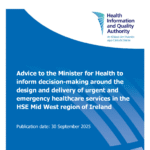The Irish Association for Emergency Medicine (IAEM) welcomes the publication of the recent report by Professor Jim Lucey, Inspector of Mental Health Services at the Mental Health Commission, on the provision of initial care to patients presenting with acute mental health issues to Emergency Departments (EDs) in Ireland. The report provides an expert critical insight into the challenges and opportunities in providing appropriate emergency access to mental health services and aligns with IAEM’s longstanding advocacy for timely, patient-centred and appropriately resourced care. It also endorses IAEM’s view that patients seeking emergency access to mental health services should be assessed in a timely manner by specialist mental health teams in an appropriate environment. Swift evaluation of these patients, by professionals trained in psychiatry, is essential to ensure that they are started on care pathways in the community, appropriate to their needs, if unscheduled admission to a mental health unit is not deemed necessary.
EDs continue to provide an easily accessible point of access for real or perceived acute and urgent healthcare needs that cannot be met in primary care within a timeframe appropriate to the patient’s needs. As such, EDs are most often the first port of call for people experiencing an acute mental health crisis. Prof. Lucey’s report acknowledges this imperfect reality, acknowledging that EDs should not be the default or only pathway to access assessment and treatment for people suffering with mental health issues. IAEM agrees strongly with this perspective and supports the call for a broader, better-integrated network of mental health services, including crisis care cafes and community mental health centres, to provide alternative access points for care. Such services can offer immediate support in a more appropriate, non-clinical setting and also act as alternatives to ED presentation. By addressing crises in the community, these services can relieve pressure on hospital EDs and ensure mental health crises are managed in environments better suited to patient recovery.
The current pathways place vulnerable patients with mental health emergencies with other patients seeking time-critical care in overcrowded, overstretched EDs, creating predictable and preventable risk. IAEM echoes the concern over the poverty of space in many EDs, infrastructure which is not purpose-built to cater for the specific and often complex needs of mental health patients. This physical constraint further exacerbates the challenges of providing a safe and therapeutic environment for psychiatric care. IAEM welcomes the acknowledgement in the recently launched Liaison Psychiatry Model of Care, of the critical importance of parallel assessments by liaison psychiatry services, which are co-located in many EDs. Such Liaison teams should ensure a concurrent psychiatric evaluation alongside the treatment or exclusion of acute medical illness or injury, if appropriate, and also facilitate better communication and continuity of care for patients with mental health concerns.
Patients presenting with isolated psychiatric conditions, i.e., those without concomitant medical issues, should be promptly identified and managed by liaison psychiatry services directly. Individuals deemed in need of inpatient care should be transferred without delay to approved psychiatric centres. EDs are not appropriate environments for patients requiring admission for the treatment of acute mental health issues. Governance and responsibility for the care of mental health patients requiring admission from the ED should be provided by psychiatric services.
Prof. Lucey highlights the inconsistency in mental health service provision across Ireland, with stark disparities between Model 3 and Model 4 hospitals. This uneven access results in delays in assessment and care, particularly in hospitals with limited liaison psychiatry staffing or insufficient facilities.
IAEM is particularly concerned about the report’s findings regarding child and adolescent mental health services. The prolonged lodging of children with mental health needs in EDs is unacceptable but, unfortunately, all too common. This practice highlights a systemic failure to provide timely, age-appropriate care. Investment in dedicated child and adolescent mental health units must be made a national priority.
Under the Mental Health Act and the National Clinical Programme for Self-Harm and Suicide Prevention, the HSE is mandated to provide 24/7 mental health services. However, the reality often falls short of this standard and IAEM urges the HSE and mental health service leadership to translate these policy commitments into practical, adequately resourced and consistently delivered services. In light of rising overall healthcare demand and by extension, rising mental health needs, the Association supports Prof. Lucey’s call for significant new investment in both hospital-based and community-based mental health services. This investment must include:
- Adequate staffing and resourcing of liaison psychiatry teams in all EDs;
- Purpose-built facilities within or adjacent to EDs for psychiatric assessment;
- Clear, accountable pathways for transfer and governance of mental health patients;
- Nationally consistent access to 24/7 mental health services for patients of all ages;
- Expansion of community supports, including crisis cafes and mental health centres.
Prof. Lucey’s report is a timely and necessary input into the national conversation on mental health care in Ireland. We welcome its findings and urge immediate and decisive action from the Department of Health, the HSE and mental health service leaders. EDs will continue to play a key role in the mental health care pathway for some patients but that role must be part of a wider, better-resourced and more humane system of mental health care delivery. IAEM remains committed to advocating for improved systems that respect the dignity, safety and mental well-being of all patients.





